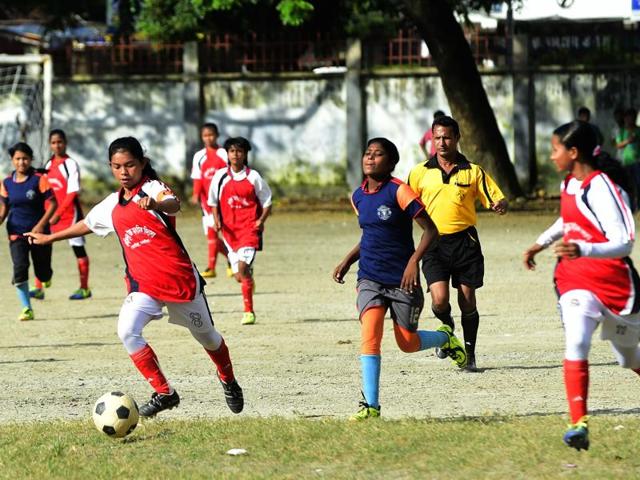“Strength lies not in conforming to the world’s expectations, but in breaking barriers to create your own path. When you choose to chase your dreams, you empower not just yourself, but those who follow.”

In the small villages of the Kekri subdivision in Ajmer, Rajasthan (India) every other house has a daughter who plays professional football. There are 550 girls in these villages who are footballers. Around 240 girls have taken a stand against child marriage. Many of them have even broken off their engagements to continue playing football. Six girls have obtained D-licenses and become football coaches. Fifteen girls have represented the state in national tournaments. The guidance and support for these girls have come from Indira Pancholi, the Director of the Women’s Human Rights Committee, and coordinator Padma Ji.
Pancholi shared that during a visit to West Bengal to address the issue of child marriage, she observed that the village girls would play football in the fields behind police stations after school. They would carry their football kits in their school bags. Inspired by this, she decided to bring about a similar change in her own district of Ajmer. She organized sports festivals in the villages and made an announcement throughout Ajmer inviting all girls who wanted to play football to join. Many girls came forward, but when it came to traveling outside the village for practice and competitions, their families stopped them. The reason given was that football was considered a boy’s sport. They feared that if their daughters got injured, no one would want to marry them, and people would have negative opinions about girls traveling outside the village.
Despite these challenges, the girls’ passion for football continued to grow. They began standing up for themselves, and the police and administration took notice of the situation. This led to a major shift – the girls began playing football openly. There were instances where, in state-level tournaments, both finalist teams were formed by the Women’s Human Rights Committee. Now, every evening, coaches from the Women’s Human Rights Committee train the girls in these villages, helping them hone their football skills. The movement has not only empowered these girls but also challenged deep-rooted societal norms, creating a ripple effect of change in the community.
The Three Major Struggles Overcome by the Daughters of Kekri :
- Football Practice Denied at School: In Chachiyawas village, the government school refused to allow football practice for girls. Undeterred, the girls began practicing on empty fields. As their passion for football spread across Ajmer, several prestigious schools, including Mayo, started offering their grounds for practice.
- Breaking the Gender Barrier: The belief that football was only for boys was a major hurdle. To challenge this, the girls worked tirelessly, practicing day and night. Today, in these 13 villages, boys are seen playing football alongside the girls, inspired by their courage and dedication.
- Choosing Between Marriage and Football: Many girls faced a difficult moment in their lives, where they had to choose between an early arranged marriage or pursuing their passion for football. In every case, the girls chose football. Many of them went on to become national and state-level players.
Documentary on the Daughters of Kekri: “Kicking Balls “
A documentary titled Kicking Balls, directed by Ashwini Yardi and Oscar-winning producer Guneet Monga Kapoor, has recently been released on Prasar Bharati. The 40-minute film showcases the struggles and triumphs of the daughters of Kekri. It has won seven awards, including at the New York Film Festival, and has been officially selected at multiple film festivals. The film highlights the journey of these courageous girls, their challenges, and the inspiring transformation they have brought about in their community.
Sumeetra Meghwal, Hansiyawas
“I got married when I was in 6th grade, and my gauna (post-marriage ritual) was supposed to happen after 10th grade. But by then, my career in football had started showing results. With the help of the law, I was able to stop my gauna. Today, I am working in the textile industry in Bengaluru.”
Payal Prajapati, Chachiyawas
“I got married when I was just 10 years old. My family was pressuring me to go through with the gauna, but I stayed connected to football. Soon, I began winning state and national trophies. This made my family start believing in me. Now, I plan to become a coach and teach football to other girls like myself.”